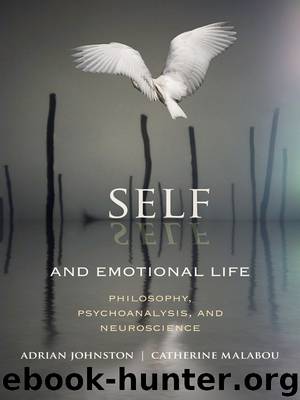Self and Emotional Life by Johnston Adrian; Malabou Catherine;

Author:Johnston, Adrian; Malabou, Catherine;
Language: eng
Format: epub
Tags: -
Publisher: Columbia University Press
Published: 2013-04-11T04:00:00+00:00
12.
EMOTIONAL LIFE AFTER LACAN
FROM PSYCHOANALYSIS TO THE NEUROSCIENCES
Among those readers of Lacan not inclined immediately to denounce his version of psychoanalysis as entirely devoid of any serious and sustained treatment of affective life—Lacanian psychoanalysis is all too frequently caricatured as a disembodied, formalist structuralism neglecting everything apart from static symbolic-linguistic systems—much attention has been paid to his tenth seminar. As noted, Lacan himself appeals to this particular seminar, with its focus on anxiety, as exculpatory evidence against accusations that he mishandles or ignores affects (accusations coming from a number of quarters: phenomenologies, poststructuralisms, deconstructionisms, feminisms, non-Lacanian psychoanalytic orientations, and so on). Various exegetes sympathetic to Lacan, taking their lead from this appeal, attempt to derive a broader Lacanian metapsychology of affect from his discussions of anxiety in 1962–1963.
But, one already might ask at this point: given the undeniable existence of numerous phenomena that are identifiable as “affective,” how can a mere one-academic-year-out-of-twenty-seven examination of anxiety alone be presented as an adequately thorough psychoanalytic theorization of affects? Preemptively anticipating one likely Lacanian response among others to this question, one might pose another query that seems appropriate: what justifies asserting that anxiety is the single, sole affect recognized as such by psychoanalysis, when so many other affects appear to be important and relevant in both clinical and theoretical psychoanalysis? For Lacan, if becoming a speaking being (the precise sort of being who ends up babbling on analysts’ couches) entails, as one of many consequences, estrangement from one’s emotions and feelings as self-evident, self-transparent conscious experiences—in other words, as a parlêtre, one is deprived of the guarantee of certainty that, when one feels a feeling, one feels that one feels this feeling as such—then anxiety is the uniquely human affect. Why? Only human beings become subjects qua speaking beings ($); and, one of the results of such subjectification is, by virtue of the mediation of signifiers, a loss of any (pre)supposed immediacy at the level of affective experience. The subject’s ensuing uncertainties about its emotions and feelings, uncertainties deliberately aggravated and intensified in analysands by the analytic process, generate any number of sensations that can span the negative emotional-sensational spectrum, ranging from subtle, low-burn discomfort to acute, all-consuming angst, from being vaguely ill at ease to being frantic with panic (the latter state sometimes precipitating rash behaviors of the sort referred to by all analytic orientations as instances of “acting-out”).1 Every point along this range arguably involves anxiety, itself arguably distinct from any similar states of sensation (such as fear) apparently common to both humans and animals.
Thus, on this interpretation, Lacan isn’t saying that anxiety is the one-and-only emotion or feeling of interest and pertinence to psychoanalysis. Rather, his partially outlined metapsychology of affective life proposes a tacit distinction between, on the one hand, affect and, on the other hand, emotion and feeling (one ought to recall the earlier unearthing and extensions of the Affekt-Gefühl-Empfindung triad buried in Freud’s original German texts and, somewhat surprisingly, passed over without remark by Lacan). Hence, countless emotions and feelings could be taken into account by a Lacanian analysis.
Download
This site does not store any files on its server. We only index and link to content provided by other sites. Please contact the content providers to delete copyright contents if any and email us, we'll remove relevant links or contents immediately.
| Anthropology | Archaeology |
| Philosophy | Politics & Government |
| Social Sciences | Sociology |
| Women's Studies |
The remains of the day by Kazuo Ishiguro(8352)
Tools of Titans by Timothy Ferriss(7765)
Giovanni's Room by James Baldwin(6774)
The Black Swan by Nassim Nicholas Taleb(6733)
Inner Engineering: A Yogi's Guide to Joy by Sadhguru(6422)
The Way of Zen by Alan W. Watts(6266)
Asking the Right Questions: A Guide to Critical Thinking by M. Neil Browne & Stuart M. Keeley(5336)
The Power of Now: A Guide to Spiritual Enlightenment by Eckhart Tolle(5308)
The Six Wives Of Henry VIII (WOMEN IN HISTORY) by Fraser Antonia(5209)
Astrophysics for People in a Hurry by Neil DeGrasse Tyson(4987)
12 Rules for Life by Jordan B. Peterson(4154)
Housekeeping by Marilynne Robinson(4039)
The Ethical Slut by Janet W. Hardy(4020)
Skin in the Game by Nassim Nicholas Taleb(3954)
Double Down (Diary of a Wimpy Kid Book 11) by Jeff Kinney(3898)
Ikigai by Héctor García & Francesc Miralles(3849)
The Art of Happiness by The Dalai Lama(3833)
Skin in the Game: Hidden Asymmetries in Daily Life by Nassim Nicholas Taleb(3711)
Walking by Henry David Thoreau(3669)
